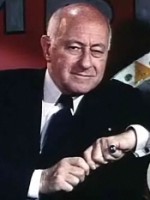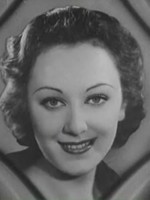Trixie Friganza is a Actor American born on 29 november 1870 at Grenola (USA)

Trixie Friganza (November 29, 1870 – February 27, 1955), born Delia O’Callaghan, began her career as an operetta soubrette, working her way from the chorus to starring in musical comedies to having her own feature act on the vaudeville circuit.
She transitioned to film in the early 1920s mostly playing small characters that were quirky and comedic and retired from the stage in 1940 due to health concerns. She spent her last years teaching drama to young women in a convent school and when she died she left everything to the convent. She became a highly sought after comic actress after the success of The Chaperons (played "Aramanthe Dedincourt") and is best known for her stage roles of Caroline Vokes (or Vokins?) in The Orchid, Mrs. Radcliffe in The Sweetest Girl in Paris, for multiple roles in The Passing Show of 1912, and of course her unforgettable run as a vaudeville headliner. During the height of her career, she used her fame to promote social, civic, and political issues of importance, such as self-love and the Suffragist movement.
Younger women were concerned with sexual freedom and equality, and demonstrated this by experimenting with “public behavior and new gender roles” (Glenn 6). Friganza used her celebrity status to promote and further the rights of women as well as other causes such as promoting the arts to the economically disenfranshised. Newspapers noted that many performances in which she was involved held performances for orphans and children from lower income families.
Trixie Friganza was quite a beauty, thick and thin, and though she used her occasional single status to sing songs (like “No Wedding Bells for Me”) and make jokes about being desperate for a man, she had many beaus. Her first marriage was to an unknown man in the late 1890s and newspapers reported that she was divorced from this “John Doe” in September 1899. Her second marriage, which took place during the summer of 1901, was to a Dr. Barry, the physician hired aboard the steamship Bohemian, upon which the cast sailed from Boston. The wedding was held at Stermin’s Hotel and those in attendance were fellow actors and cast members of Belle of Bohemia. She and the Doctor were divorced several years later, though the exact date is unknown. On August 20, 1909, tabloids reported that Trixie was to be engaged to Nat M. Wills, but nothing more was said of this and she did not in fact marry the man. Her third marriage, taking place in New York on March 10, 1912, was to her manager, Charles A. Goettler. She filed for a divorce in the summer of 1914 on the grounds of “failure to provide” and “cruelty”. Records do not indicate that she was ever married again. During all of her marriages she never changed her name and was adamant about continuing her career in show business. None of the relationships yielded any children for her.
Source : Wikidata
Trixie Friganza

Birth name Delia O'Callaghan
Nationality USA
Birth 29 november 1870 at Grenola (USA)
Death 27 february 1955 (at 84 years) at La Cañada Flintridge (USA)
Nationality USA
Birth 29 november 1870 at Grenola (USA)
Death 27 february 1955 (at 84 years) at La Cañada Flintridge (USA)
She transitioned to film in the early 1920s mostly playing small characters that were quirky and comedic and retired from the stage in 1940 due to health concerns. She spent her last years teaching drama to young women in a convent school and when she died she left everything to the convent. She became a highly sought after comic actress after the success of The Chaperons (played "Aramanthe Dedincourt") and is best known for her stage roles of Caroline Vokes (or Vokins?) in The Orchid, Mrs. Radcliffe in The Sweetest Girl in Paris, for multiple roles in The Passing Show of 1912, and of course her unforgettable run as a vaudeville headliner. During the height of her career, she used her fame to promote social, civic, and political issues of importance, such as self-love and the Suffragist movement.
Biography
Trixie Friganza was civic minded and socially attuned. She was not progressive by modern standards, but for a woman at the turn of the twentieth century to align herself with women's suffrage and to promote a positive female body image was pretty radical. On October 28, 1908, Trixie attended a women’s suffrage rally at New York City Hall where she delivered a speech for women’s rights. She donated money to the cause and repeatedly went on record as an advocate for women’s rights, equality and independence. Her own personal life is consistent with those ideals; having taken her mother’s maiden name and refusing to leave her career in spite of marriage, she defied society’s proprieties and norms, modeling what Susan Glenn calls "New Woman".Younger women were concerned with sexual freedom and equality, and demonstrated this by experimenting with “public behavior and new gender roles” (Glenn 6). Friganza used her celebrity status to promote and further the rights of women as well as other causes such as promoting the arts to the economically disenfranshised. Newspapers noted that many performances in which she was involved held performances for orphans and children from lower income families.
Trixie Friganza was quite a beauty, thick and thin, and though she used her occasional single status to sing songs (like “No Wedding Bells for Me”) and make jokes about being desperate for a man, she had many beaus. Her first marriage was to an unknown man in the late 1890s and newspapers reported that she was divorced from this “John Doe” in September 1899. Her second marriage, which took place during the summer of 1901, was to a Dr. Barry, the physician hired aboard the steamship Bohemian, upon which the cast sailed from Boston. The wedding was held at Stermin’s Hotel and those in attendance were fellow actors and cast members of Belle of Bohemia. She and the Doctor were divorced several years later, though the exact date is unknown. On August 20, 1909, tabloids reported that Trixie was to be engaged to Nat M. Wills, but nothing more was said of this and she did not in fact marry the man. Her third marriage, taking place in New York on March 10, 1912, was to her manager, Charles A. Goettler. She filed for a divorce in the summer of 1914 on the grounds of “failure to provide” and “cruelty”. Records do not indicate that she was ever married again. During all of her marriages she never changed her name and was adamant about continuing her career in show business. None of the relationships yielded any children for her.
Usually with
Filmography of Trixie Friganza (14 films)
Actress
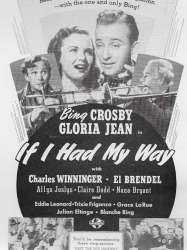
If I Had My Way (1940)
, 1h33Directed by David Butler
Origin USA
Genres Comedy, Musical
Themes Musical films
Actors Bing Crosby, Gloria Jean, Charles Winninger, El Brendel, Allyn Joslyn, Claire Dodd
Roles Herself
Rating60%





Buzz Blackwell, Fred Johnson and Axel Swenson are construction workers who are building a bridge. They are good friends and Buzz and Axel even help Fred raising his daughter Patricia. When Fred tragically dies in a fatal accident, Patricia is forced to live with her relatives in New York City whom she has never met. Buzz and Axel decide to depart with her. They soon arrive at her uncle and aunt Jarvis and Brenda, who are horrible persons. Jarvis is a snobby rich man, while Brenda is supercilious. Jarvis has received a letter from Buzz, warning him for their arrival and wants no part in raising Patricia. As they show up, Jarvis pretends to be someone else and sends them to the other "J. Johnson". This is Joe, Patricia's great uncle and husband of Marian. They are poor ex-vaudevillans but welcome them with open arms. Buzz wants to give Joe Fred's money he left him for Patricia, but finds out a drunken Axel used that money to buy a Swedish restaurant. This restaurant, which is doomed to fail, is now the only money bringer for the Johnsons. Buzz is determined to help them out and turns the restaurant in a night club, but is bothered with Jarvis, he has returned to claim "his" money back.

Myrt and Marge (1933)
, 1h5Directed by Al Boasberg
Origin USA
Genres Comedy
Themes Buddy films
Actors Ted Healy, Moe Howard, Larry Fine, Eddie Foy, Jr., Curly Howard, Thomas E. Jackson
Roles Mrs. Minter
Rating71%





Film adaptation of the popular 1930s radio serial. Myrt Spear's (Myrtle Vail) touring vaudeville revue is full of talent and bound for Broadway, but low on funds. Conniving and lecherous producer Mr. Jackson (Thomas Jackson) helps the show so he can romance the young star, Marge Minter (Donna Damerel).
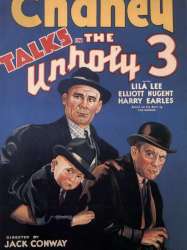
The Unholy Three (1930)
, 1h12Directed by Jack Conway
Origin USA
Genres Drama, Crime, Romance
Themes Films about sexuality, LGBT-related film, Cross-dressing in film
Actors Lon Chaney, Lila Lee, Elliott Nugent, Harry Earles, Clarence Burton, John Miljan
Roles Lady Customer (uncredited)
Rating66%





A sideshow is closed by the police after Tweedledee (Harry Earles), the embittered "Twenty Inch Man", kicks a baby, starting a riot. Echo, the ventriloquist, proposes that Tweedledee, the strongman Hercules (Ivan Linow), and he leave and, as "The Unholy Three", use their talents to commit crimes. Echo also takes along his pickpocket girlfriend Rosie (Lila Lee) and his gorilla, whom Hercules fears.

Free and Easy (1930)
, 1h32Directed by Edward Sedgwick
Origin USA
Genres Comedy, Musical
Themes Films about television
Actors Buster Keaton, Anita Page, Dorothy Sebastian, David Burton, Trixie Friganza, Robert Montgomery
Roles Ma
Rating55%





When small-town girl Elvira Plunkett (Anita Page) wins a contest that sends her to Hollywood for a screen test at Metro-Goldwyn-Mayer (MGM), she is accompanied by her overbearing mother (Trixie Friganza) and Elmer J. Butts (Buster Keaton), a gas-station attendant who goes along as Elvira's manager. Elmer is secretly in love with Elvira, but on the train they meet MGM contract actor Larry Mitchell (Robert Montgomery), who falls for her as well, and has the connections to make her a star.

The March of Time (1930)
Directed by Charles Reisner
Origin USA
Genres Musical
Themes Films about music and musicians, Musical films
Actors Ramón Novarro, William Collier Jr., Jimmy Durante, William Collier Sr, Clyde Wilfred Cook, Trixie Friganza
Roles Self - Old Timer Sequence
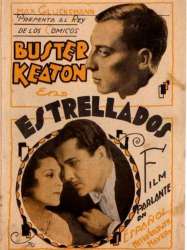
Estrellados (1930)
, 1h36Directed by Edward Sedgwick
Origin USA
Genres Comedy
Actors Raquel Torres, Buster Keaton, Don Alvarado, Carlos Villarías, Émile Chautard, Lionel Barrymore
Roles La Duquesa / Herself (Guest Appearance at Premiere)
Rating64%






Gentlemen Prefer Blondes (1928)
, 1h15Directed by Malcolm St. Clair
Origin USA
Genres Comedy
Actors Alice White, Ford Sterling, Holmes Herbert, Mack Swain, Emily Fitzroy, Trixie Friganza
Roles Mrs. Spoffard

Monte Carlo (1926)
Directed by Christy Cabanne
Origin USA
Genres Drama, Comedy
Actors Lew Cody, Gertrude Olmstead, Roy D'Arcy, Karl Dane, Zasu Pitts, Margaret Campbell
Roles Flossie Payne
An American adventurer hides from pursuing detectives in the hotel room of a young schoolteacher.
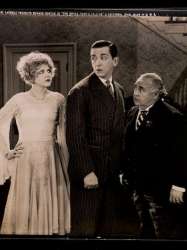
The Whole Town's Talking (1926)
Directed by Edward Laemmle
Origin USA
Genres War, Comedy, Romantic comedy, Adventure, Romance
Actors Edward Everett Horton, Virginia Lee Corbin, Trixie Friganza, Otis Harlan, Aileen Manning, Hayden Stevenson
Roles Mrs. George Simmons
Rating58%





This script must be run from the command line
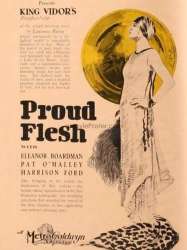
Proud Flesh (1925)
, 1h10Directed by King Vidor
Origin USA
Genres Drama, Comedy, Comedy-drama, Romance
Actors Eleanor Boardman, Patrick H. O'Malley Jr., Harrison Ford, Trixie Friganza, Sōjin Kamiyama, George Nichols
Roles Mrs. McKee
Rating51%





A San Francisco earthquake orphan is adopted by relatives in Spain and gets wooed by a Romeo there. She turns him down to return to a San Francisco plumber.
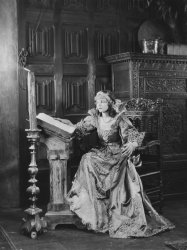
The Road to Yesterday (1925)
, 2h16Directed by Cecil B. DeMille
Origin USA
Genres Drama, Comedy-drama, Fantasy, Romance
Actors Joseph Schildkraut, Jetta Goudal, William Boyd, William Boyd, Vera Reynolds, Trixie Friganza
Roles Harriet Tyrell
Rating62%






Borrowed Finery (1925)
Directed by Oscar Apfel
Origin USA
Genres Drama
Actors Louise Lorraine, Ward Crane, Lou Tellegen, Hedda Hopper, Gertrude Astor, Trixie Friganza
Roles Mrs. Brown
Sheila Conroy, un mannequin, emprunte une robe pour se rendre à une fête. Harlan, un escroc de la société se faisant passer pour un agent du gouvernement, lui offre un poste d'assistante. Elle accepte ce poste pour aider sa sœur, Lilly, et le mari de Lilly, Billy. Ce dernier a détourné de l'argent de son entreprise et risque d'être découvert. La mission de Sheila est d'obtenir les "preuves" nécessaires sur Mme Bordon, une riche veuve qui a fait entrer clandestinement un joyau de grande valeur dans le pays. Channing Maynard, un vrai agent du gouvernement qui est amoureux de Sheila, démasque Harlan et épouse Sheila.

The Coming of Amos (1925)
, 1hDirected by Paul Sloane
Origin USA
Genres Romance
Actors Rod La Rocque, Jetta Goudal, Noah Beery Sr., Richard Carle, Arthur Hoyt, Trixie Friganza
Roles Dowager Duchess of Parth
Rating65%






The Charmer (1925)
, 1h19Directed by Sidney Olcott
Origin USA
Genres Drama
Actors Pola Negri, Robert Frazer, Wallace MacDonald, Cesare Gravina, Trixie Friganza, Gertrude Astor
Roles Mama
Sollicitée par un imprésario, une jeune danseuse espagnole est engagée en Amérique. Elle se dispute les faveurs d'un gentleman et de son chauffeur, homme très sympathique qui obtiendra à la fin, le cœur et la main de la belle.
 Connection
Connection
